“Gamers are part of our creative process” - Activision's Eric Hirshberg
The Activision CEO on rescuing Call of Duty, re-launching Destiny and what comes next for Skylanders
"Did you know I created the first ad campaigns for Twin Peaks?"
Our interview with Activision CEO Eric Hirshberg had taken a surprising turn.
We were discussing the power of nostalgia and how that might benefit the firm's Crash Bandicoot remake. I was reeling off a number of recent 1980s and 1990s IP that had come back, like Ghostbusters, X-Files and Twin Peaks.
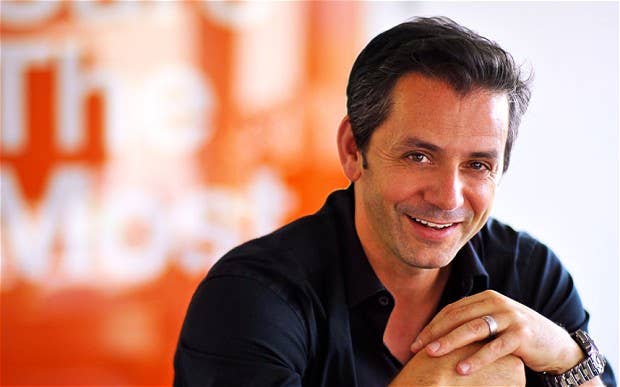
"It was one of my first big creative assignments," Hirshberg recalls. "My background is that of an advertising creative. I was just one year out of college. ABC TV was a client at the agency I worked at, and we did this really cool campaign that won a load of awards for Twin Peaks. The tagline was 'America's Watching', and it was all people's theories over who killed Laura Palmer. It was unscripted. We went out and found real fans and filmed them in their environments and listened to their crazy theories."
The idea behind the 'America's Watching' campaign seemed pretty much in-line with his strategy at Activision: look at what the fans are doing, speak with them, and let them lead the way. What worked for Twin Peaks 28 years ago can work for Call of Duty today.
And it's a theme that ran though a conversation as we discussed the next steps for Call of Duty, Destiny and Skylanders.
"Call of Duty Infinite Warfare was clearly one future game too many"
The reception to last year's Call of Duty: Infinite Warfare was surprising in its negativity.
Activision had hoped the space setting, plus a Modern Warfare remake, would delight the fans. But it failed the trailer quickly became the most disliked gaming video on YouTube.
"I don't know what you're referring to," jokes Hirshberg.
Twelve months on and the reaction to this year's Call of Duty: WWII is significantly stronger, in part because it's set in the past. It seems like Activision is reacting to the fans (there's the Twin Peaks strategy again) and it is, although the publisher insists it was aware of the fatigue around futuristic warfare long before last year's game.
"It was clearly one future game too many," he says. "If I could have had WWII a year earlier, knowing what I know now, then obviously the timing would have been better considering the community culture at the time. But we green light these games three years in advance. We were picking up enough in the feedback loop when green lighting this game, that it might be a good time to return to our roots.
"When we took Call of Duty to future settings with Black Ops II, that was really good at the time. It added freshness to the franchise, which it needed back then. These pendulums always swing, and so the reception of [WWII] I think, first and foremost, is because it looks great, but also, clearly, it is the right game at the right time."
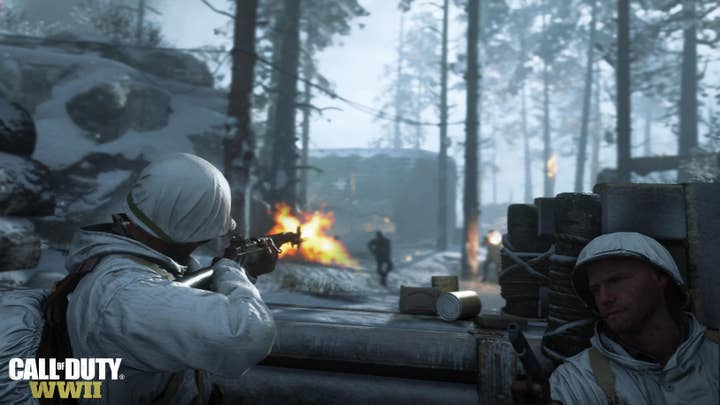
Call of Duty is proving a complicated beast for Activision, with players now split between different games, whether that's Black Ops III, Modern Warfare Remastered, Advanced Warfare or Infinite Warfare.
"Call of Duty is unique, not only in gaming but in culture, in that it has had an annual release and has been at the top of the charts for so many years in a row. It's probably unprecedented," Hirshberg begins.
"As a result, some unique benefits and challenges have emerged. One of them is that we now have multiple game universes active at one time. Our policy has been that as long as they're playing a Call of Duty game, we're happy. If people bought the new game but decided to go back to a previous one... if it's happening on a mass scale, then we want to provide new content for them. We just released the Zombies content for Black Ops III players, which is 18 months after that game launched. And it's doing really well.
"Call of Duty is less of a persistent platform as it is a persistent ethos. It is a game that makes you feel a certain way, and has certain expectations around core mechanics, tone and manner. I feel there are multiple presentations of that, and we have shown the ability to keep people engaged, sometimes for many years past the initial launch."
"Our policy has been that as long as they're playing a Call of Duty game, we're happy"
It's not unusual for Activision to create incremental content for a Call of Duty game beyond the first 12 months, but the recent Black Ops III DLC is on a far bigger scale. It's a familiar strategy to players of Rainbow Six: Siege, but it's new territory for Call of Duty.
"This is a trend you're seeing across popular culture," Hirshberg explains. "People are going deeper into the worlds they love. Whether that's Marvel, Harry Potter or Call of Duty."
He continues: "These games have a long life with our fans. You don't always know on the day you release it how long that life is going to be, so you have to respond to the behaviour from the community. That's what makes this business unique. The choices and behaviour of gamers is part of our creative process."
Hirshberg comes back to the idea that Activision isn't a rigid structure that simply follows its path no matter what. It's following whatever path its fans are on, and if that means making new stuff for Black Ops III, then so be it. The question now is if fans are playing these games for so much longer, do we even need a Call of Duty every year? Could Activision instead adopt a model similar to Destiny, where it updates the game for several years before delivering a sequel?
"Each game is unique and that there is more than one way to create a community," Hirshberg says. "Destiny 2 is a sequel, a hard reset, and that choice was not a casual decision. It was something we really debated, because if you are in a persistent universe, then obviously people's investment continues to have value in perpetuity. However, it can also become intimidating for new players to join.
"If you have an annual reset like we do with Call of Duty, you run the risk of people not coming back because that investment didn't carry over to the new game. But certainly the annual release has been a big contributor to what has kept it fresh for so long. We have been able to bring in new ideas in a way that I don't think we would have been able to do if we were still building on a persistent universe that started 10 years ago.
"So what we've found is that there is more than one good way to do it. We have a winning formula on Call of Duty. It is too early to tell, but having Destiny 1, followed by three years of expansions, and then hopefully Destiny 2 doing even better, will mean we have another winning formula."
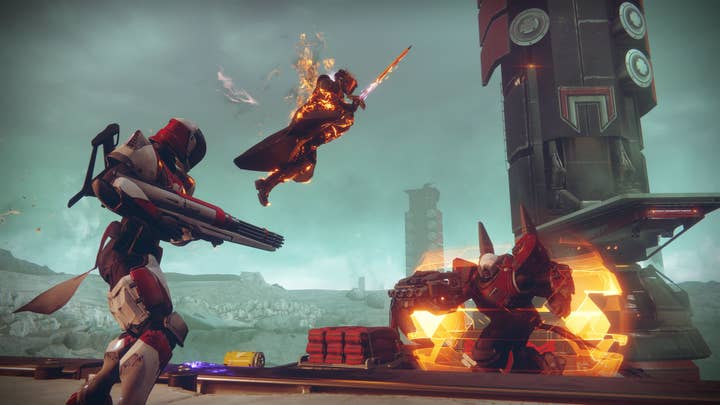
"I have not been happy with the cadence of Destiny"
The strategy around Destiny fits in with the way consumers appear to be playing their multiplayer titles. These games have become social hubs where friends play together for months, if not years. That's something Bungie tried to develop with Destiny 1, which was continually updated with DLC.
Despite the efforts to keep fans engaged, however, Hirshberg hasn't been entirely pleased with how it all went.
"I have not been happy with the cadence [of new content]," he admits.
"We got a lot right with Destiny 1, but one of the things we didn't do was keep up with the demand for new content. I feel like that, as great as [DLC packs] The Dark Below, House of Wolves, The Taken King and Rise of Iron all are, clearly there was appetite for more. One of the things you'll see post the launch of Destiny 2, is that we have got additional AAA developers from inside the Activision ecosystem working with Bungie on Destiny content, including Vicarious Visions and High Moon. That will allow us to keep an even more robust pipeline of content in the ecosystem."
"I never thought [toys-to-life] was dead, I just thought it was overcrowded"
One of the brands missing from Activision's schedule this year is Skylanders. It was once the publisher's fastest rising franchise, but it's now on life support following several years of decline.
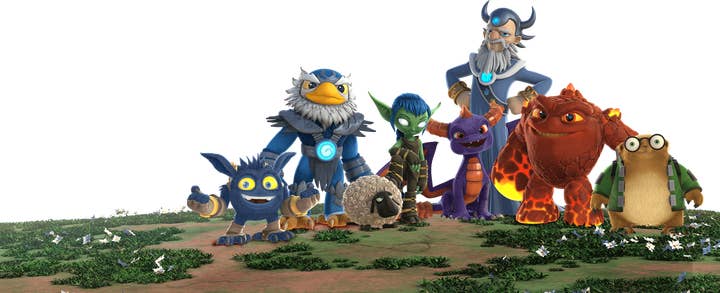
It's clear to see what went wrong. The genre was flooded with similar games from other major publishers, and everyone lost. There will be no major toys-to-life game released this year.
However, Ubisoft surprised people at E3 by revealing Starlink, which is a different take on the genre. Does this reassure Hirshberg that there's more to come from toys-to-life?
"I never thought [toys-to-life] was dead, I just thought it was overcrowded," Hirshberg says. "There was an imbalance between supply and demand. I think at one point there was a couple of hundred linear feet of shelf space in stores featuring toys-to-life games from four of the biggest marketers of kids IP in the world.
"A new market had been created with Skylanders. It was a way of making toys relevant to 21st century kids, who are interactive entertainment consumers in their DNA. And so, on one level, it wasn't surprising to see that rush into the genre. But it certainly did create a more difficult macro environment. Skylanders... we're still behind it. We have supported [last year's game] Imaginators with expansion packs in the way that we didn't with previous games. We have a great Skylanders TV series on Netflix. We have a mobile game in development that we are very excited about. And we are going to see what the right way is to continue to invest in it.
"None of the current generation of consoles have quite captured that family, casual gaming market in the same way as the Wii did"
"What I know is that people love those characters and that world, there's nothing broken about the franchise. It just became a little bit more different as a business proposition with all that competition. We shall see how it plays out."
We suggested that the struggle with Skylanders was made harder by the death of the Wii.
"Yes," he agrees. "None of the current generation of consoles have quite captured that family, casual gaming market in the same way as the Wii did. Not even the Wii U. Skylanders' bread and butter is the kids, family and casual gaming market. So the absence of that stronghold in the hardware ecosystem was a difficult thing as well. But look, we want to go where gamers are. Certainly kids are still playing games, they're just playing them on different platforms. A lot of casual gaming has moved to mobile. With Skylanders, we will find our way."
With Skylanders off the schedule, and with titles like Guitar Hero failing to stage a comeback, Activision has a hole in its line-up. It has always been proud of its billion-dollar franchises, so when can we expect the next one?
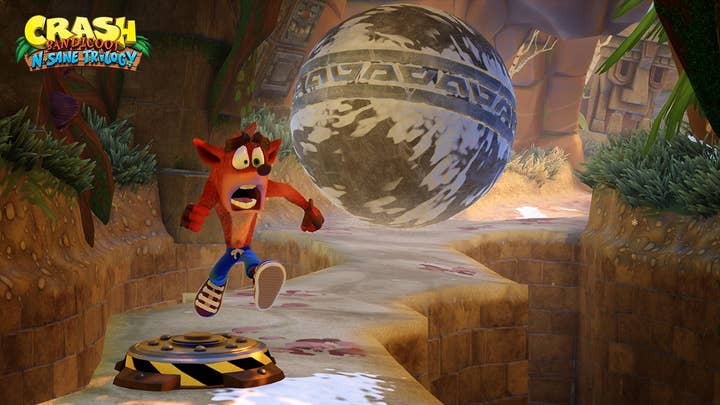
Hirshberg says the firm is always talking to teams (internally and externally), but also told us not to forget the return of Crash Bandicoot.
"We are experimenting with Crash," he says. "We know there's a vocal fanbase that wanted that to come back. But you never know if that is emblematic of a larger audience or just this niche, nostalgia-based community. So far, we are seeing some real passion for it, so that could lead to other things.
"Of course, we are always trying to find the next big thing. But our first priority is to make sure we are servicing the communities that we are already lucky enough to have."
It all comes back to the same notion behind Hirshberg's Twin Peaks ad campaign: follow the fans.
The challenge for Activision is in keeping up.








